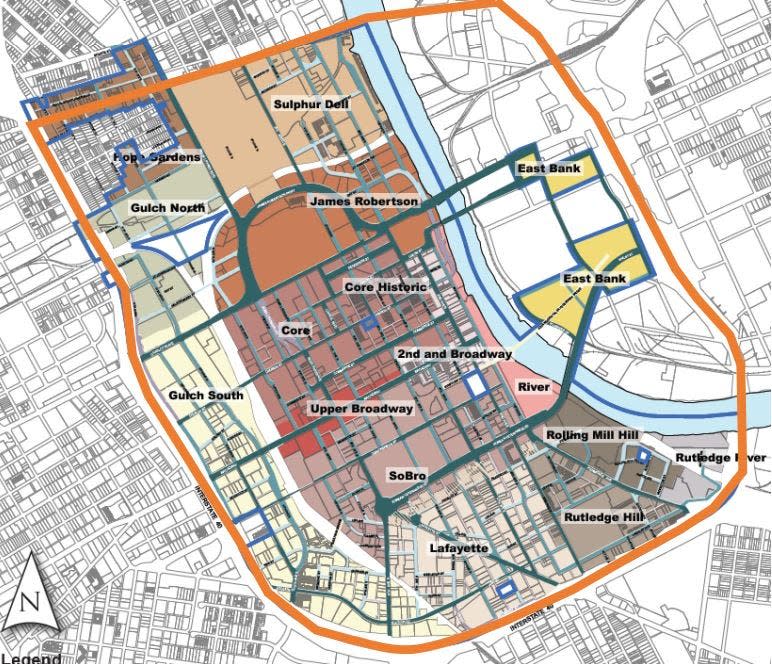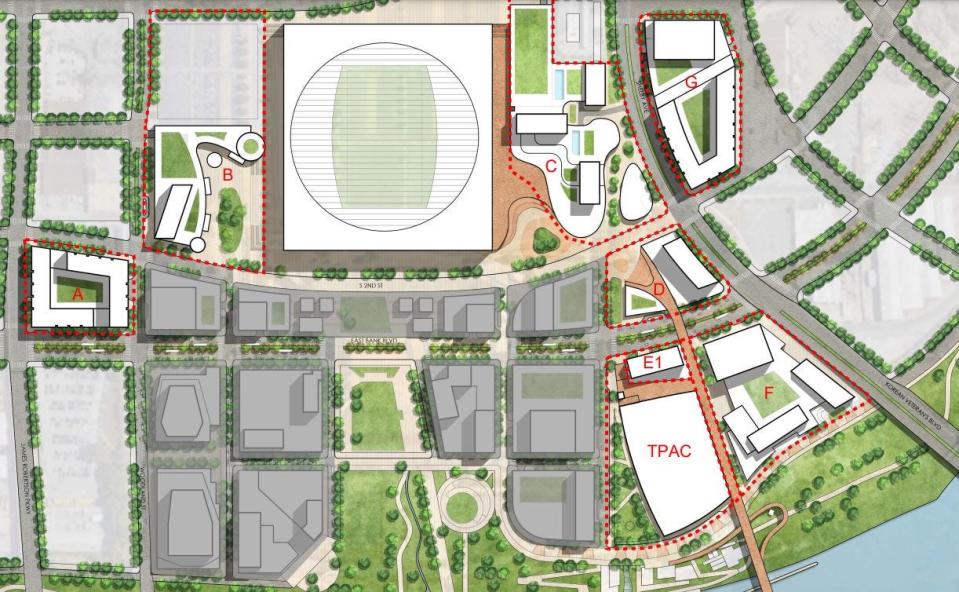Nuts and bolts: What's in Nashville's proposed East Bank development deal
An East Bank development deal under consideration by Nashville's council reveals how the city's newest riverfront neighborhood will take shape over the next decade.
Hundreds of acres of industrial land and parking lots will soon be humming with construction activity. The Tennessee Titans broke ground on a new, $2.1 billion stadium Thursday with a target opening date in April 2027. And if a proposed deal between Metro and development firm The Fallon Company is ultimately approved, work on an initial 30 acres of Metro-owned land surrounding the stadium site could begin as soon as Spring 2026, working from plots closest to the stadium toward parcels closest to the river.
The deal on the table offers more details on 695 promised affordable housing units, the character of the neighborhood and the division of costs between Metro, Fallon, the Titans and the Tennessee Performing Arts Center. It also provides a clearer view of an estimated timeline for the first steps of what will be Nashville's most expansive project to date.
Metro Council will consider the 438-page development package for the first time on Thursday, in addition to a nonbinding resolution outlining terms with TPAC for the construction of a new facility on East Bank land.
Metro's development agreement with Fallon will need to pass three readings to go into effect. Nashville Mayor Freddie O'Connell's administration is aiming for Council approval by April 16, the last council meeting before the city's annual budget process begins in May. Otherwise, further consideration of the legislation will be bumped to July.
Housing and affordability
The deal on the table would require Fallon to build 1,550 units across five residential buildings, including 695 income-restricted units.
At least 600 of the affordable units will be located in two income-restricted buildings, with construction on the first 300-unit building estimated to begin in 2026 (the first construction phase for the project overall). The other 300 units are envisioned as part of an East Bank transit hub, with a construction timeline not yet determined.
Income restrictions are based on where a tenant's income falls compared to the Area Median Income, a federal benchmark marking a typical household's annual earnings in a given area. In 2023, the AMI for a family of four in the Nashville area (which spans 10 counties, including Williamson) was $99,850.
Proposed income restriction requirements include:
Two-thirds of the units in each income-restricted building would be reserved for tenants at 60% AMI and under (with opportunities for deeply affordable options available through Housing Choice and Project-Based vouchers)
One-third of the units in each income-restricted building would be reserved for tenants between 60% and 80% AMI
At least 10% (95 units) in market-price residential buildings would be reserved as income restricted at 80% AMI or below
All income-restricted units would remain income-restricted for the entirety of the 99-year ground lease with Metro
Units will be available in multiple sizes, from studio apartments to multiple bedrooms
A tenant's rent in an income-restricted unit would not be adjusted unless their voucher would cover the increase, leaving the tenant's portion of rent unaffected
If an income-restricted unit tenant's income increases above the maximum level, the tenant may choose to renew the lease at the end of its term at market rate, and the property will designate the next available comparable unit as income-restricted
Contractual milestones for Fallon are also centered around residential unit delivery:
Within two years: Deliver 300 affordable units along with reserved space for day care
Within six years: Deliver 400 additional residential units (40 of which are affordable)
Within nine years: Deliver 550 additional residential units (55 of which are affordable)
After James Robertson Parkway is lowered to grade (timeline to be determined): Deliver 300 additional affordable residential units to be developed atop an East Bank mobility hub
More: Nashville mayor's office seeks to create East Bank authority to oversee development
Neighborhood feel
In addition to setting residential unit requirements, the contract proposal between Metro and Fallon bakes in limits on the number of hotel buildings and prohibits certain uses like short-term rentals and casinos.
"Our goal is to put a neighborhood around (the new stadium) that's a genuine, actual neighborhood and not just an extended party zone," Metro Nashville Chief Development Officer Bob Mendes said during a community meeting Thursday.
Fallon would reserve a space for a day care facility alongside the first 300 residential units, and all buildings will feature ground-level retail.
The developer would also "diligently investigate" opportunities to incorporate grocery stores, additional day cares, cultural facilities and local businesses (retail, restaurants and others). But building up enough residential density to attract grocery stores will take time, Mendes said. Plans for the first 30 acres place emphasis on residential offerings to build a neighborhood, but those residents on Metro's parcels alone likely won't support a grocery store.

Metro's East Bank land would be rezoned to be part of the Downtown Code, which would create an "East Use Area" allowing Metro to set more specific conditions for development. Early ideas for conditions include potentially restricting the number of bars in the area and their proximity to one another.
The Downtown Code zoning will also delineate building height on the East Bank. Anna Grider, a member of Metro Planning Department's East Bank team, said the department's current vision includes a maximum of 40 stories around the stadium, tapering down to around four to six stories closest to the river. The Bonus Height program available to developers in other neighborhoods covered by the Downtown Code will not be available on the East Bank, she said.
Zoning changes must be approved by the Metro Planning Commission and Metro Council, and that process is expected to conclude around September.
Fallon would also be required to create a "Public Space Framework Plan" detailing the scale, character and design for parts of the project in the public realm, to be approved by the Metro Planning Department.

The 30-acre development area could have a maximum of three hotels, though this limit would not apply to a parcel of land located to the left of the new Nissan Stadium.
The deal allows for construction of office space on Parcel G, with the provision that it remain office space for 10 years. If the developer isn't able to find a market-rate tenant for that location (or they find an office tenant for a building elsewhere on the Metro-owned property), the space could be developed for other uses, including a hotel that would not be counted toward the hotel limit.
Splitting the infrastructure bill
"Infrastructure on the East Bank is expensive," Mendes said Thursday, but he and O'Connell's administration believe that maintaining Metro's ownership of the East Bank land allows the city to keep control of the land as it is developed, particularly when it comes to infrastructure and affordable housing.
Under the proposed agreement, an extension of the John Seigenthaler Pedestrian Bridge will be designed and constructed by Fallon (with Metro design approval), and financed by Fallon and TPAC. TPAC would be responsible for ensuring continuous accessibility to pedestrians and cyclists throughout construction. Mendes said Metro intends to ensure the pedestrian bridge is never shut down by a private party for special events.
Fallon would cover costs for:
Part of the East Bank boulevard from Victory Avenue to Korean Veterans Boulevard
Part of Waterside Drive and part of Sylvan Street
In a separate agreement expected to go before Metro Council this summer, TPAC would cover costs for:
Victory Avenue from Second Street to Waterside Drive
Part of Waterside Drive
A temporary structure to maintain pedestrian bridge access through construction
Metro would bear the costs for a pedestrian bridge spanning East Bank Boulevard and the removal and relocation of a Colonial Pipeline.
Metro is also "obligated to use good faith efforts to obtain any rights over any CSX property" within or around the 30-acre area that would be needed to complete Waterside Drive. Mendes said the tracks in that area serve only the nearby scrap yard, which may eventually move, and he's hopeful CSX will agree to remove the tracks in the future.
An open-air plaza adjoining the stadium will be built, furnished and maintained by the Titans.
In keeping with the Titans stadium agreement passed in 2023, Metro will maintain at least 2,000 parking spaces to be guaranteed for stadium use on event days.
The Titans will develop parking on Parcel B (to the left of the stadium), and Metro will have the option to build structured parking on that parcel at Metro's cost. Metro could also decide to build structured parking on Parcel C, to the right of the stadium, at taxpayer expense. The Titans will receive all revenue from parking on Parcel B. The team will also receive all revenue from those 2,000 Metro-owned parking spaces during stadium events, and Metro will receive revenue from those spaces at all other times.
Fallon and ground tenants are not obligated to build parking for the stadium, but can choose to offer parking during stadium events.
For the time being, enough surface parking remains to satisfy Metro's contractual requirement to the Titans, so the city will likely hold off on parking garage construction and keep options open until a later date.
Money going to Metro
Fallon will pay rent to Metro based on type of use and values to be determined by an appraiser, with annual escalations. TPAC will pay a lower than market-rate rent to Metro for its ground lease (with the idea being that it is footing initial infrastructure costs instead).
Fallon will pay property taxes to Metro as though Fallon owned the land. If state law changes, Fallon would contractually continue to pay Metro the equivalent amount in "additional rent" each year.
Upon the sale or refinancing of property within the Initial Development Area, the tenant shall pay Metro a percentage of the proceeds in "future participation rent": 0.75% for market residential ground leases and 1% for other ground leases (except for 100% affordable residential buildings).
"This participation rent is supposed to make it so as market value buildings increase and they inevitably change hands, that Metro will be able to share in that revenue for the taxpayers," Mendes said.
This article originally appeared on Nashville Tennessean: What's in Nashville's proposed East Bank development deal

